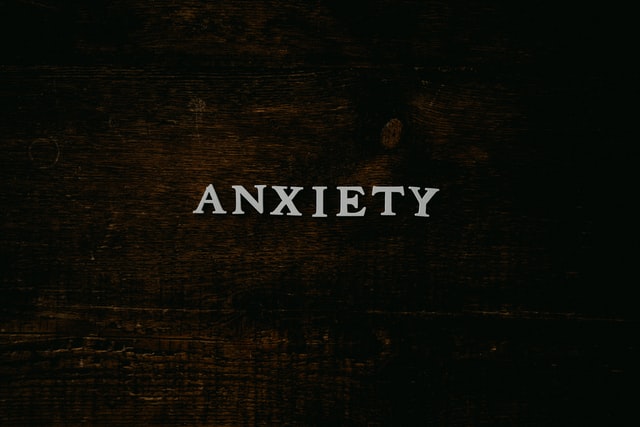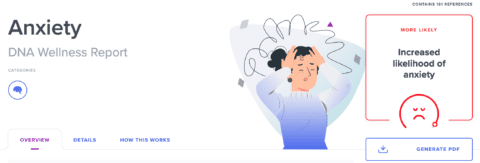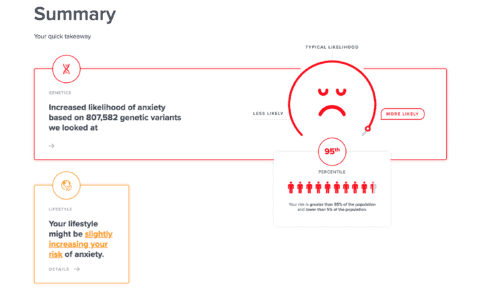
We all experience anxiety at multiple times throughout our lives: before a big test, work presentation or important life events like weddings [1]. However, those with persistent anxiety or a family history of mental illness might question: is anxiety genetic? Can a DNA test for anxiety help me understand my risks?
Anxiety can be a normal occurrence in our lives and we may never develop a more serious disorder. While some anxiety is normal, your genetic makeup can play a role in how susceptible you are to experiencing anxiety.
Here’s the good news, even if you are genetically predisposed to anxiety, there are lifestyle changes you can make to reduce the probability of you experiencing anxiety symptoms.
Types of Anxiety Disorders
Anxiety is the most common mental disorder in the United States, affecting about 18% of the population [2].
Anxiety can present in multiple ways, some of them being [1]:
- General Anxiety Disorder (GAD): Overwhelming anxiety for at least 6 months. GAD significantly affects interpersonal skills and daily responsibilities.
- Panic Disorder (PD): Characterized by a sudden onset of fear and bodily response, known as a panic attack. Panic attacks can be seemingly random or triggered by an event.
- Phobia Anxiety Disorder: Over-exaggerated fear associated with specific organisms or situations, such as spiders or closed-in spaces. People with phobia anxiety disorders often have an irrational fear of encountering the object of their phobia.
Anxiety prevalence could be determined by multiple risk factors, one of them being genetic predisposition.
There have been several genes linked to an increased risk of anxiety. Genetic testing can give you insight to your genetic makeup and if you are predisposed to feeling anxious.
Is anxiety genetic?
Until recently, the tools have not been available to study the genetic predisposition to anxiety. However, today we know that 30-67% of the differences in people’s chances of feeling anxious can be attributed to genetics.
Even early on, there has been some speculation about anxiety and genetics [3]. Anxiety was assumed to have a genetic component based on the fact that anxiety disorders tended to be more prevalent within families.
For example, if a direct family member such as your parent or sibling has an anxiety disorder, you are 4-6x more likely to develop one of your own [3].
A similar model of study showed complementary results. Studying the prevalence of anxiety in twins is a good way to measure the genetic contribution. Since identical twins have the same genetic code, determining between genetics and environmental triggers can prove useful.
For example, if one twin develops anxiety while another does not, there is a strong correlation to environmental triggers playing more of a role than genetics. However, in twin studies, we are seeing a higher likelihood of both twins developing anxiety if one of them presents with the disorder [4]. This points to a genetic predisposition to anxiety as opposed to strictly the events that unfold during your life.
Anxiety and Genetics
So, how is anxiety and genetics connected? SelfDecode has identified some genes that play a role in anxiety prevalence. We will go over some here.
RGS2: encodes for a protein that allows for communication between cells and their surrounding environment. Variants in RGS2 can lead to an overstimulated brain and contribute to higher risk for anxiety [5,6].
- Primary variant: rs4606
GABR: encodes for the receptor that accepts GABA in the brain. Variants in GABR can lead to an imbalance in GABA levels and heavily contribute to anxiety [7,8].
- Primary variants: rs211037 and rs3219151
BDNF: BDNF is known to play a role in neuron survival. It also regulates the stress hormone, cortisol, in the hippocampus of the brain. Variants in BDNF result in lower levels in the hippocampus, which in turn increases stress hormone circulation [9,10,11].
- Primary variant: rs6265
What can a DNA test for anxiety tell me?
If you are looking for the most comprehensive report of genes that affect your mental health, look no further than the SelfDecode Anxiety DNA Report.
SelfDecode’s reports allow you to take control of your genetics to optimize your mental health. The reports uncover what your genes are doing behind the scenes to affect your anxiety levels and help you learn how to counteract them with natural health recommendations.
The bottom line, your genes can predispose you to certain conditions at varying degrees depending on the mutations you possess. Some genetic mutations can be benign, barely affecting your overall health, while others can have noticeable consequences.
If you already had your DNA tested by other companies such as 23andMe, you can upload your DNA file for free to SelfDecode to discover your genetic predisposition to anxiety and receive personalized diet, lifestyle, and supplement recommendations to optimize your health.
An example of an anxiety gene in which a single nucleotide in your genetic code is responsible for phenotypic changes is BDNF. If you happen to carry the C allele (rs6265-C), you are likely to experience higher anxiety and stress-induced cortisol levels. In contrast, possessing the T allele (rs6265-T) allows for better coping mechanisms when it comes to anxiety and stressors [12,13].
SelfDecode analyzes your genetic code to pinpoint genetic variations that can make you susceptible to conditions like anxiety. SelfDecode goes a step beyond by outlining evidence-based diet, supplement, and lifestyle recommendations that are tailored to work best with your unique genetic makeup, potentially reducing your risk of feeling anxious. For example, if you had a genetic variant in RGS2, increasing vitamin D and fiber intake may be beneficial for your mental health [5].
SelfDecode is set apart from other genomics companies by analyzing over 800,000 genetic variants related to anxiety to give you the most precise data on your personalized report.
DNA Test For Anxiety Report
SelfDecode is the only direct-to-consumer company that uses AI in genomics to give you the most accurate results. With SelfDecode, you’ll receive truly personalized recommendations based on your unique genes!
Their team of over 60 MDs, Ph.D.s, and NDs sift through the scientific literature to give you the most accurate and relevant information in a way that’s easy to understand. Beyond anxiety, SelfDecode also offers over 150 DNA health & trait reports, including mood and stress.
Concluding Remarks
Understanding the link between anxiety and genetics can provide valuable insight to your risks and what action steps may most benefit you. Anxiety disorders are usually chronic, meaning they do not go away on their own.
Thankfully there are multiple avenues to manage anxiety. Anxiety disorders can be addressed by a combination of lifestyle modifications, cognitive behavioral therapy and medications.
If you are feeling anxious or overwhelmed, do not hesitate to educate yourself and talk to your doctor to find the right health regimen for you. Anxiety can be managed and you can live a life free of constant worry. If you’re interested in a gene-based approach to dealing with your anxiety, you should check out SelfDecode.
If you already had your DNA tested, you can upload your file to SelfDecode for free to discover your genetic predisposition to anxiety and personalized health recommendations based on your genes.
Related Articles
- Stress vs Anxiety: What’s the difference?
- What Is The Best DNA Test Kit? The Ultimate Guide
- Caffeine And Anxiety: What Do Your Genes Have To Say?
- Magnesium For Anxiety: Is It Right For You?
- Purple Passionflower and Anxiety: Can It Help You Calm Your Mind?
- Is Tinnitus Genetic? Causes And How To Deal



